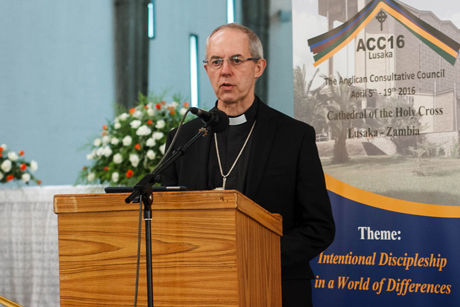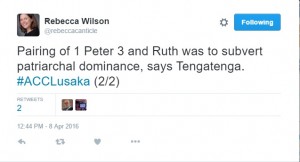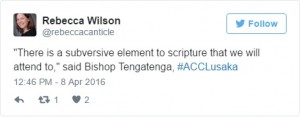The sixteenth meeting of the Anglican Consultative Council opened today with Morning Prayer. Some raised questions about the choice of lectionary for the service, in which 1 Peter 3 was read, with its admonition that wives must obey their husbands. Bishop Tengatenga addressed such questions at a close-of-day press conference, Rebecca Wilson of Canticle Communications tweeted.
“There is a subversive element to scripture that we will attend to,” Bishop Tengatenga explained.
In the afternoon, Archbishop of Canterbury Justin Welby addressed the conference on the subject of the recent Primates’ gathering in London.
The Anglican Communion is a church of immense, global and beautiful diversity. It is God-given, human-developed, history-shaped.
As God-given we are subject to the great task of collaborating with the work of God.
As human-developed we are a church of saints and sinners, of arguments and complexities, some of which are necessary and some of which are unnecessary.
As history-shaped we carry the baggage of the past, some of it wonderful, much of it a cause for shame and repentance. History includes the scriptures, our final authority when properly interpreted, the Catholic creeds, the historic episcopacy, the Dominical sacraments of baptism and Eucharist, what is called the Chicago-Lambeth Quadrilateral that sets the limits of our diversity. And at an ACC, whose theme is intentional discipleship in a world of difference, we came together in January and we come together now recognizing that our history builds complexity upon complexity, difference upon difference. …
In the midst of such difference we face a choice, of being distracted by difference or being intentionally united in discipleship to Jesus Christ. To be united by Christ, as intentional disciples, is the only way we show to the world that God raised Jesus Christ from the dead.
We are living in a world where the capacity to deal with difference is more and more required, because difference is right in front of us, difference is on our iPads, in our laptops, in our phones. We hold a whole world of difference every time we open a phone. And the response to in the world around is at best insult, and so often violence, a reality which is the living experience of many you here.
And into all this difference walks a merchant of pearls. The parable of the precious pearl is in the midst of a group of parables in Matthew’s gospel concerned with seeking the Kingdom of Heaven, and knowing what it is and how we react when we find it. The merchant is a trader in fine pearls. He knows how to make money, he has a number of pearls, and all is well until one day he finds a unique pearl. He recognises its value and importance and he recognises what he must do, which is to give up everything else to gain it. Intentional discipleship.
Archbishop Welby acknowledged the limitations of the authority of the Primates to “bind” the Provinces of the Communion.
Like all the Instruments of Communion, whether the ACC, the Archbishop of Canterbury (for I am not a human being, I am an Instrument of Communion and for that matter a focus of unity) or the Lambeth Conference, the Primates’ meeting has no legal authority over Provinces. Any kind of synodical control of that kind has been rejected since the first Lambeth Conference. Neither can any one instrument legally bind another Instrument. The Anglican Communion only works when the relationships within it are good enough to permit a common discernment of the way in which we are being led by the Spirit.
Returning to the January meeting, Welby continued, quoting the Primates’ communique:
“The unanimous (note that, unanimous) decision of the Primates (there was only one absent by choice, there were two others absent, one through family bereavement and one through illness) … The unanimous decision of the Primates was to walk together, however painful this is, and despite our differences, as a deep expression of our unity in the body of Christ.”
Given this commitment to their unity, it is inaccurate always to speak of suspension and expulsion, or sanction. Instead the Primates openly acknowledged the distance that exists between us on some issues and considered the consequences where decisions put strain on relationships.
Addressing the “consequences” that the Primates offered the Episcopal Church, he continued
There is a time limited restriction in governance and representative roles; the Primates said that for a three-year period the Episcopal Church, TEC, should not take part in decisions on matters of doctrine or polity. They can speak but we suggested that they should not vote, nor should they represent the Communion on external bodies such as those dealing with interfaith or ecumenical matters.
Moreover, because walking at a distance is not how it should be, a Task Group was appointed “to maintain conversation among ourselves with the intention of restoration of relationship, the rebuilding of mutual trust, healing the legacy of hurt, recognising the extent of our commonality and exploring our deep differences, ensuring they are held between us in the love and grace of Christ.” That Task Group has been set up. I was asked to create it. And it has been set up with a very wide representation on it of women and men, lay and ordained, from every part of the Communion.
He concluded,
As Anglicans we are called to be something special, a people of reconciliation, finding authority through relationships, transcending complexity and difference, relishing diversity, loving each other. A monument, a beacon to the hope of Christ. In a world that burns with hellish darkness visible, may we above all see not just what we are, but what we can be when we turn aside to the Pearl of the Kingdom, a pearl only seen clearly when we love one another. When that happens, in this broken world, by the grace of God in the power of the Spirit, then we Anglicans can become a profound blessing of peace and hope.
Read the address in full here.



